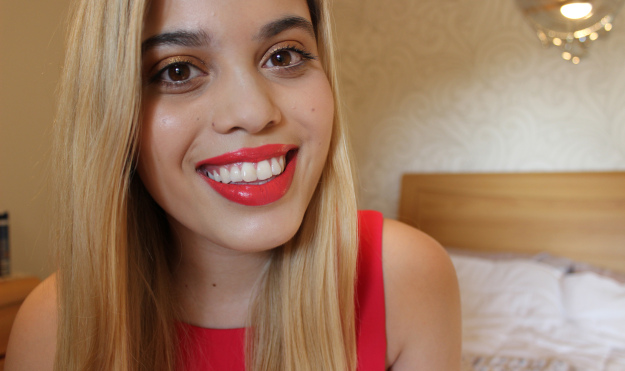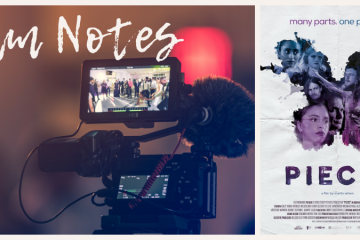
In a previous post, I shared a little of my journey as the mother of child born with congenital heart disease (CHD). Today, I’m handing over the blog to Shakira, who offers us a different perspective: what it’s like growing up as a HeartKid. This is her informative and inspiring story.
Meet Shakira
 My name is Shakira and I am a 19 year old Psychology student with a penchant for flower crowns, bright lipstick and kimonos with tassels. I enjoy watching soppy films and listening to depressing folk songs, and if burgers were an acceptable choice of breakfast food I would never eat anything else ever again. I write a lot of terrible songs and love making music, but if I could be anything I’d most certainly be a fairy, so sometimes people pay me to dress up as one; this is thoroughly enjoyable and gives me an excuse to cover my face with copious amounts of glitter, but more on that later.
My name is Shakira and I am a 19 year old Psychology student with a penchant for flower crowns, bright lipstick and kimonos with tassels. I enjoy watching soppy films and listening to depressing folk songs, and if burgers were an acceptable choice of breakfast food I would never eat anything else ever again. I write a lot of terrible songs and love making music, but if I could be anything I’d most certainly be a fairy, so sometimes people pay me to dress up as one; this is thoroughly enjoyable and gives me an excuse to cover my face with copious amounts of glitter, but more on that later.
None of these things, however, are particularly relevant to the purpose of this post, which is to share my experience as a young person with Congenital Heart Disease (CHD). Yes, I do have heart disease, and no I am not 80…although my candle collection and habit of drinking tea instead of alcohol on Saturday nights may suggest otherwise. February is CHD awareness month and so I have been asked to tell you my story, but before I begin I must say thank you to Melinda for letting me hijack her lovely little corner of the internet.
The Journey Begins
Now, let’s start at the beginning. I was born on the 16th of August 1995, two months earlier then planned, but my parents were thrilled to finally have their first child after 1 stillborn, 16 miscarriages and many desperate years of trying. The joy of their newborn daughter however, turned to confusion and despair a week later when they were told that I was born with a complex congenital heart condition. I was diagnosed with dextrocardia, meaning that my heart was on the right instead of the left, transposition of the great arteries, which is a fancy way of saying that my heart is back to front, a number VSD’s or holes, pulmonary stenosis which is the narrowing of the pulmonary artery, and finally a leakage in the tricuspid valve between the right atrium and ventricle. Of course, I can’t exactly say how my parents were feeling at this time, but I’m sure that after expecting and waiting patiently for a healthy child, they were feeling distressed and alone. I can imagine that the uncertainty and doubt that they faced would have been somewhat overwhelming, especially as first time parents, and instead of being able to celebrate the most anticipated moment of much of their adult life they were thrown into unchartered waters. Today, I admire their strength and courage, and look up to them a great deal.
Open Heart Surgery
At ten months old, my family headed to the Royal Children’s Hospital in Melbourne, where I underwent open heart surgery and the first stage of the fontan procedure was completed successfully. The second and final stage was performed in Perth in 2001, when I was age 5 and in grade one at school. Although I can’t remember much about how I was feeling at this time I do remember being very scared and confused as to what was happening, and according to my mum I was not the ideal patient. I must have been pretty awful, because my cardiologist still remembers my talent for tantrums! Oh well. One memory I do have was asking my mum if I was going to die. But as you’ve probably assumed – I didn’t!
The surgery went well, except for being readmitted for a month, three days after being discharged to drain fluid build up. Missing a lot of school at this crucial stage of learning can be difficult and often children have to repeat a year; however, I was lucky to have wonderful parents and teachers who helped me a lot at home and in hospital, so, despite missing three terms of year one, I was able to start year 2 on time.
Ongoing Medical Treatment
In 2008, while in my first year of high school at Santa Maria College, it became apparent that a conduit that was inserted as a part of the fontan procedure had caused the pressures in my stomach to be raised, causing me to lose increased levels of protein. This meant that I would need immunoglobulin infusions to boost my immune system, as well as a range of other medications such as diuretics to manage fluid levels, and steroids to help with fatigue. This condition is known as Protein Losing Enteropathy. It was later realised that the infusions were not making any difference and were thus discontinued. Not many other drugs have had a positive effect on the condition either and my health and energy tends to wax and wane quite randomly, which has proved quite puzzling for doctors, but what’s life without mystery, eh?
In early 2011 I had an interventional cardiac catheter performed by Dr Shipton and my regular cardiologist Dr D’orsogna. They used a needle with a hook on it to form a hole (or fenestration) through the conduit. The logic behind this, was that it would hopefully help to lessen the pressures the conduit was creating, and therefore reduce the amount of protein I lose. However, it also means that more deoxygenated blood is mixing with my oxygenated blood, causing my saturation levels to drop, so at first I was a lot more fatigued and out of breath than usual.
When I first found out that I needed this operation, I was relatively confident and didn’t feel too worried. It wasn’t open heart, so I was happy about that, and although it was going to be quite a long procedure, my first two surgeries had been much longer. Two days before surgery, I had to go into hospital for an immunoglobulin infusion, and again the following day for a blood transfusion. That day, Dr Shipton (whom I had never met), spoke to me about what would happen. As he explained the procedure in detail, what they would have to do if they weren’t successful the first time, and that he had only been involved in five of these procedures (one in which they had to pull out of), I got more and more scared. After holding them back for a while, the tears began to flow. I had never experienced a consultation with a surgeon before, as I had been too young, and although he was a lovely man, what he was saying put me off a little. But after some chocolate, a good nights sleep and realising that plenty of people, including myself, had gone through even tougher operations and struggles, I felt ready for the day ahead. Everything went well, and I was back on the ward from ICU that night, and went home the next afternoon.
A few months later, my cardiologist decided that I was still losing too much protein and suggested that the fenestration be widened. This was done at the end of 2011. There were apparently some issues with the anaestethic where I showed signs of malignant hyperthermia. After this procedure I was extremely fatigued and out of breath all the time, and I struggled to walk a few steps to the bathroom in our little house without needing to lie down again. My saturation levels were sitting in the 50s and 60s and there was one night where I was so tired I couldn’t even sit up at the dinner table long enough to eat my meal.
Over a few weeks things got slightly better and I was able to walk around slowly with lots of rests in between. Basically the drop in my oxygen levels meant that I what I was experiencing was equivalent to altitude sickness, which was expected, and my body would adapt over time. After a few weeks I was still much more fatigued and breathless than anticipated so I was given an iron infusion and magically I started to feel much better in the coming days. By January I was able to sing and dance (badly) with a performance troupe I belonged to; however, I still experienced breathless days for some time and I recall my saturation levels dropping down to about 35 on the day of my school ball in February. But that obviously wan’t going to stop me from attending!
Currently, my breathing is much better and my oxygen levels generally sit in the mid 80’s which is where my doctor was hoping they would be after the fenestration. I am able to do light exercise although sometimes stairs present a bit of a challenge, but not one that I can’t overcome. Like I stated earlier, I’m still waxing and waning but overall I can’t really complain too much. As we have exhausted all other treatment options the next step is a transplant, but this is considered a ‘last resort’ and my health and quality of life would have to deteriorate somewhat before it would be required.
Transitioning to the Adult System
I have recently transitioned to the adult system which at first was a bit overwhelming and I think that perhaps there should be more supports in place for young people, who are no longer children or teenagers, who have heart defects. I have been very lucky not to need a hospital admission for the past few years, due to careful management of my condition and developing a routine that suits me. Over the years I have come to understand and recognise certain signs that my body gives me and I have learnt how to arrange my social life, work and study around my what my body needs. However, in August last year I went to the GP about some chest pain. It turned out to be of little concern, but not before being sent to Royal Perth Hospital in the middle of the night.
I was admitted into a cardiac ward that hosted three men with an average age of about 75, and my mum was asked to leave. Fortunately at 1am she can be pretty feisty and so she was allowed to stay! That night we were treated to a game of Musical Beds where the men showcased how prolifically talented they were at passing gas in turns. I’m sure that they were lovely men, but for me, as a 19 year old girl, they weren’t particularly pleasant roommates. I have also started an exercise program at Hollywood Hospital which I enjoy despite being the youngest in the gym by about 40 years. Another thing I have noticed about the adult system is how easily you can get lost in the system, and how abrupt the transition is. There are so many unknowns in this new adult world and it is a little hard to navigate.
Loving My Life
But what does it really feel like to be a young person with congenital heart disease? Well, to be honest, I think it’s fine! While I was in high school it was difficult because I missed a lot of school. In year 12, my attendance rate was about 30%, but I had wonderful teachers and a supportive school, as well as very helpful parents. This meant that I was able to complete my WACE and achieved the ATAR I was aiming for, receiving the Principals Award at school, and a Merit Award from the university where I now study, part time, as I am unable to commit to full time classes without becoming too unwell. Perhaps things aren’t perfect, but there are always people who are worse off and I actually have a really lovely life.
Of course this is just my perspective, and I can’t speak for everyone in a similar position, but I am happy exactly how I am. I don’t feel left out or unhappy at all, and I am blessed with wonderful caring friends and family. I have been given amazing opportunities and because of my heart condition I have even discovered one of my favourite hobbies, which is singing; When I was about 7 I performed at a karaoke night at the Starlight Foundation and my mum realised that nobody tried to rip their ears out while I was on stage, so I started abusing the karaoke machine at home and eventually started lessons, and am so glad I did! I have sung at many exciting corporate and high profile events around the state, one of the highlights being singing a duet with Suzi DeMachi from Baby Animals at the Strike A Chord Ball in 2012.
There have been difficult moments, like when my close friend Claire died from the same condition I have when I was 13, or in primary school when I couldn’t really keep up physically with the rest of my class mates. I didn’t get to enjoy my school ball as much as I’d hoped because I was unwell, and being poked and prodded during infusions was sometimes tiresome, but nothing that a delicious Tandoori Chicken Panini couldn’t fix! I also think it’s sad that because of my heart condition I’ll never be a Tennis Grand Slam Champion because obviously that’s the only thing that’s stopping me (ha).
However, I truly believe that the good things in my life, outweigh the bad and I will never let my condition get in the way of anything I want to achieve. I am in my third year of Psychology at UWA, and after working a few different part times jobs I have started my own children’s party hosting business, where we organise all the fun and entertainment for birthday parties and have their favourite characters attend and enchant the children. It’s called Parties for Poppets. It’s only small but going steady, and attracting increasing attention from parents and local businesses alike. I also mentioned at the beginning of the article that I enjoy making music and I am always writing and plan on recording and producing a few tracks in the near future. I would love to travel and am even considering studying abroad in England or perhaps Ireland for six months, which my cardiologist says shouldn’t be a problem.
So, even though it can be hard, I believe that my heart condition has made me a stronger, determined, more understanding person. It has especially brought me closer to my parents and I will always have more love, adoration, and admiration for them then any other human being.
Finally, I’d like to end by saying that it’s important to remember that obstacles are supposed to be a challenge but they should not be a stopping point. They are there to be overcome. There is a Chinese proverb which I think is relevant to all people regardless of what sort of challenges and problems they face. It can be applied to situations as simple as being stuck in traffic, or to something more serious such as a facing a chronic illness, and I think it sums up how important a person’s attitude towards life is. The proverb reads ‘Pain is inevitable, suffering is optional’.





[…] has established her own business running children’s parties. You can read her inspiring story in my next post. But sadly, I’ve also farewelled a number of Heart Angels, who grew their wings way too […]
What an amazing insight. Thank you so much for sharing your story, Shakira. You are an inspiration.
My Mum’s little sister was born with CHD. At that time there was nothing that could be done though 6 months after she became a little angel there was some progress in treatments. So much progress has been made since.
I wish you all the very best in achieving your dreams.
Hi Susan, thanks so much for taking the time to comment – I will make sure that Shakira sees your comment. I’d love to hear more about your mum’s sister some time, and your the impact on your mum. It would be interesting to know the time period and the history of treatment since then, too.